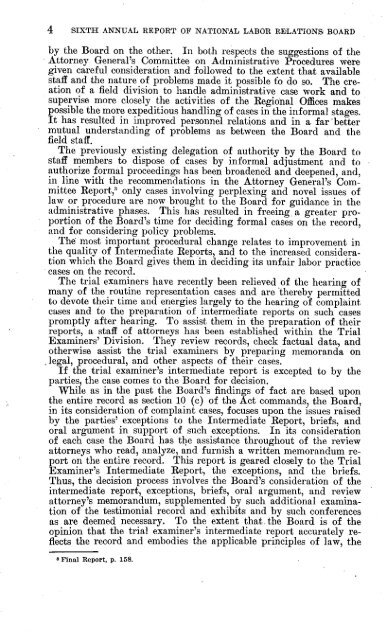NATIONAL LABOR RELATIONS BOARD
NATIONAL LABOR RELATIONS BOARD
NATIONAL LABOR RELATIONS BOARD
You also want an ePaper? Increase the reach of your titles
YUMPU automatically turns print PDFs into web optimized ePapers that Google loves.
4 SIXTH ANNUAL REPORT OF <strong>NATIONAL</strong> <strong>LABOR</strong> <strong>RELATIONS</strong> <strong>BOARD</strong><br />
by the Board on the other. In both respects the suggestions of the<br />
Attorney General's Committee on Administrative Procedures were<br />
given careful consideration and followed to the extent that available<br />
staff and the nature of problems made it possible fo do so. The creation<br />
of a field division to handle administrative case work and to<br />
supervise more closely the activities of the Regional Offices makes<br />
possible the more expeditious handling of cases in the informal stages.<br />
It has resulted in improved personnel relations and in a far 'better<br />
mutual understanding of problems as between the Board and the<br />
field staff.<br />
The previously existing delegation of authority by the Board to<br />
staff members to dispose of cases by informal adjustment and to<br />
authorize formal proceedings has been broadened and deepened, and,<br />
in line with the recommendations in the Attorney General's Committee<br />
Report, 3 only cases involving perplexing and novel issues of<br />
law or procedure are now brought to the Board for guidance in the<br />
administrative phases. This has resulted in freeing a greater proportion<br />
of the Board's time for deciding formal cases on the record,<br />
and for considering policy problems.<br />
The most important procedural change relates to improvement in<br />
the quality of Intermediate Reports, and to the increased consideration<br />
which the Board gives them in deciding its unfair labor practice<br />
cases on the record.<br />
The trial examiners have recently been relieved of the hearing of<br />
many of the routine representation cases and are 'thereby permitted<br />
to devote their time and energies largely to the hearing of complaint<br />
cases and to the preparation of intermediate reports on such cases<br />
promptly after hearing. To assist them in the preparation of their<br />
reports, a staff of attorneys has been established within the Trial<br />
Examiners' Division. They review records, check factual data and<br />
otherwise assist the trial examiners by preparing memoranda on<br />
legal, procedural, and other aspects of their cases.<br />
If the trial examiner's intermediate report is excepted to by the<br />
parties, the case comes to the Board for decision.<br />
While as in the past the Board's findings of fact are based upon<br />
the entire record as section 10 (c) of the Act commands, the Board,<br />
in its consideration of complaint cases focuses upon the issues raised<br />
by the parties' exceptions to the Intermediate Report, briefs, and<br />
oral argument in support of such exceptions. In its consideration<br />
of each case the Board has the assistance throughout of the review<br />
attorneys who read, analyze, and furnish a written memorandum report<br />
on the entire record. This report is geared closely to the Trial<br />
Examiner's Intermediate Report, the exceptions, and the briefs.<br />
Thus, the decision process involves the Board's consideration of the<br />
intermediate report, exceptions, briefs, oral argument, and review<br />
attorney's memorandum, supplemented by such additional examination<br />
of the testimonial record and exhibits and by such conferences<br />
as are deemed necessary. To the extent that the Board is of the<br />
opinion that the trial examiner's intermediate report accurately reflects<br />
the record and embodies the applicable principles of law, the<br />
8 Final Report, p.158.
















